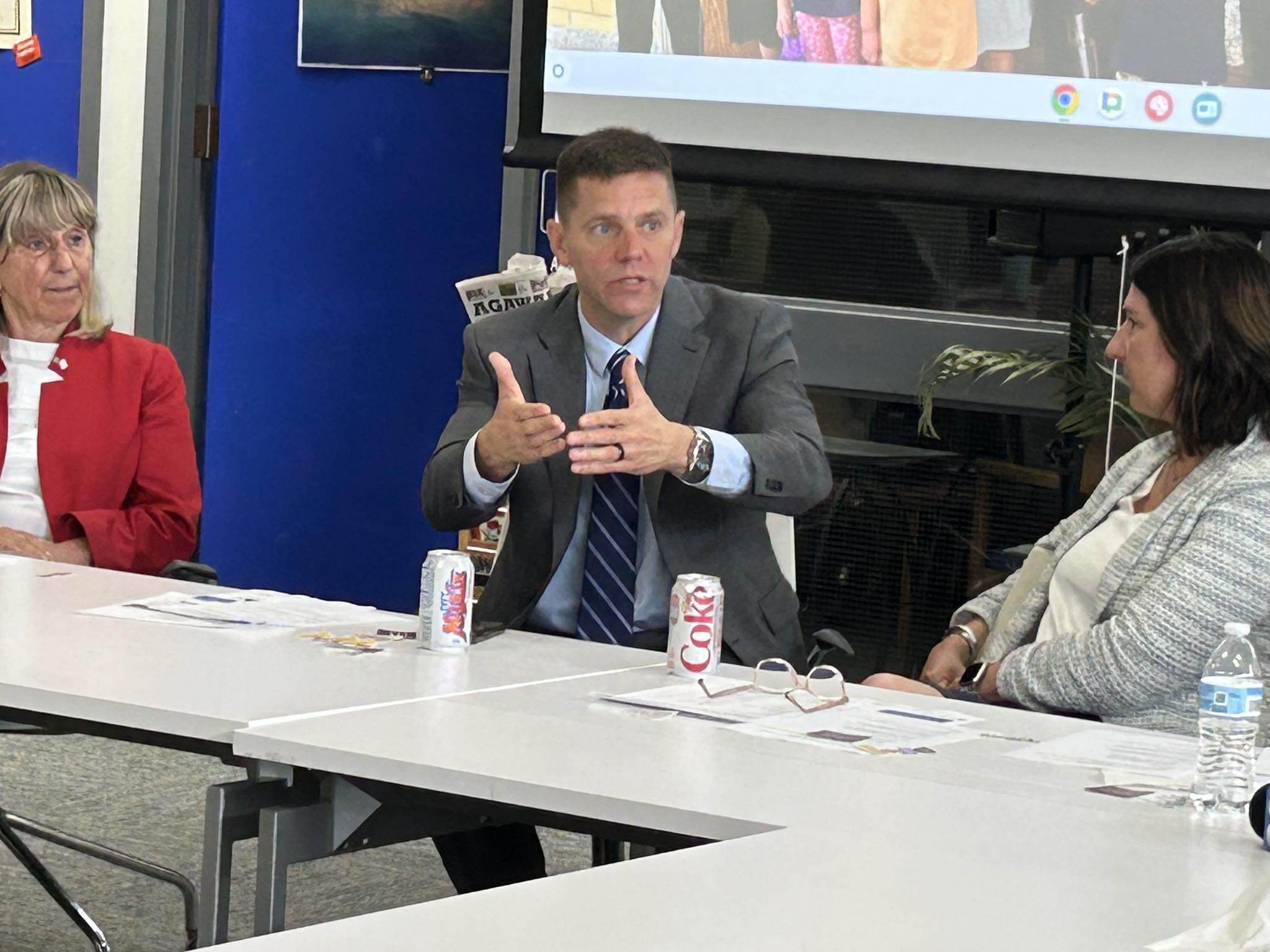State Sen. John Velis and state Sen. President Karen Spilka joined the town of Agawam at the Agawam Junior High School on June 10 to talk about the impact of a school-based behavioral health program launched in the Agawam Public School district known as “MCPAP for Schools.” The town was one of two municipalities in the district to pilot this program over the past school year.
Reminder Publishing photo by Ryan Feyre
AGAWAM — Over the past school year, Agawam was one of two school districts in the commonwealth to pilot a program that helps improve behavioral health outcomes for the districts’ students.
The result so far, according to state lawmakers, has been rewarding.
“It’s remarkable to be in a Senate that focuses on school-based behavioral health,” said state Sen. John Velis (D-Westfield). “[There’s] been stellar results.”
Since the fall, Agawam Public Schools has been working with Boston Children’s Hospital’s Neighborhood Partnerships program and the Massachusetts Child Psychiatry Access Program to develop, implement and pilot a school-based behavioral health consultation and training model.
Lawmakers say the implementation of the model comes at a time when students are facing more mental health crisis’ than ever before, mainly due to the lasting impacts of COVID-19.
“Times are tough,” said state Sen. President Karen Spilka (D-Ashland). “It’s hard being a kid these days … we need, as adults, to make it as easy as possible.”
According to Jen Brennan, the MCPAP consultant through BCHNP, the pilot model has allowed the program’s partners to take a large assessment of Agawam Public Schools at the beginning of the year to see where the district is at regarding mental health.
Following that assessment, each building in the district inherited a team that looks at data regularly to see which students are struggling with behavioral health the most so they then can connect those students and their parents to necessary resources that address specific, individual needs.
Brennan said the model has helped connect students to resources in a timelier manner.
“We’re reaching more students, reaching out to families more and really talking about their students’ needs and mental health and getting them supported,” Brennan said.
In 2023, the Massachusetts Senate adopted a $500,000 amendment sponsored by Velis to create this school-based behavioral health program. On June 10, Velis and Spilka joined program partners, as well as Agawam administrators, students and staff for a roundtable at Agawam Junior High School about how the pilot program has gone so far.
Although press was unable to attend the student portion of the roundtable due to privacy concerns, lawmakers and partners said after the discussion that students were very receptive to the program’s mission and future.
“I was happy to see that they were very open, talking about their issues and the help that the pilot program has given them and afforded them to be stronger and to come to school and feel better about coming to school,” Spilka said. “That is what we as adults want. We want them to feel better about themselves, their circumstances, and to help give them the tools to do all of that.”
Velis highlighted how, instead of waiting nine months to receive necessary behavioral health help, the pilot program is making sure students get the behavioral health help as soon as possible.
“It’s allowing them to get professional help virtually immediately,” Velis said. “That’s the benefit of this program.”
Brennan said the program’s partners have already made great gains this school year when it comes to increasing student access to community providers, but the goal now is to find a sustainable process that school districts across the state can follow.
“It’s going to take time to continue to build,” Brennan said. “Our hope is to have other school districts be able to learn lessons from Agawam and be able to also support their own communities as well.”
A few weeks ago, during the Senate’s debate of the fiscal year 2026 budget, a $500,000 amendment from Velis was again adopted to help continue and expand the program across the state.
Talking to reporters after the roundtable, Velis said that the senate leadership’s work around mental and behavioral health is something they are very proud of and will continue to prioritize.
“Rest assured; these are all things that we will take under consideration throughout the entire commonwealth,” Velis said. “And again, hearing it from the kids is really, really important.”
Readers can learn more about this pilot program by visiting tinyurl.com/5eufcujp.



